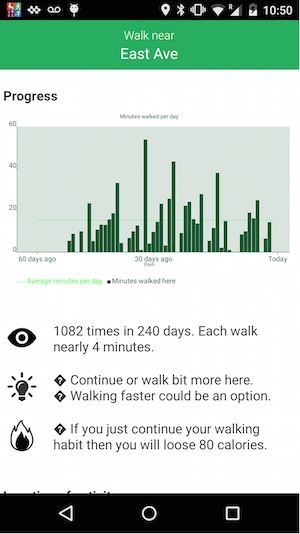 A new app, developed at the interaction design lab at Cornell University, has a novel approach to helping users lose weight: an algorithm that latches onto the healthy behaviors users are already doing and then gradually encourages them to do more of the same.
A new app, developed at the interaction design lab at Cornell University, has a novel approach to helping users lose weight: an algorithm that latches onto the healthy behaviors users are already doing and then gradually encourages them to do more of the same.
The app is called MyBehavior, and it's set to launch in the Google Play store in September. The research team already did a 14-week study of the app with 16 users, which will be presented at ubiquitous computing conference UbiComp in Japan next month. Another study, a three-week randomized control trial with 17 participants, was published in May in the Journal of Medical Internet Research.
"If you look at the current apps, they typically try to motivate you," Mashfiqui Rabbi, the PhD student leading the team, told MobiHealthNews. "They say this is your step count. [Get it higher,] we don’t care how you do it. So for us we try to analyze the user data, try to see what they repeatedly do, see what they can do easily, and then we feed on top of that and try to make users more efficient at what they’re already doing and eventually move them to the goal."
So if a user is already going to the gym once a week, the app might encourage them to go twice a week, or to work out a little bit longer. But if all the user is doing is walking to work, the app would encourage them to keep taking that walk, maybe walking a little further or faster. The engine is built on a decision theory model called "Multi-armed bandit" or MAB -- the same model Google uses to serve ads and Yahoo uses to suggest personalized news articles. It has the additional advantage of being light on processing power, so the algorithm can run natively on the device rather than on the cloud.
The latest study showed that the app caused statistically significant increases in walking minutes, calories burned by nonwalking exercise, and a decrease in calorie consumption per meal. Meanwhile, the JMIR study showed a significant increase in walking, but no change in food consumption.
The app also advises users about their food choices by having them take pictures of their meals. Those pictures are then sent to Amazon's Mechanical Turk, a service that provides remote human labor for computational tasks. People working for Mechanical Turk figure out the approximate calories in each food based on the photographs.
"If you don’t do it [that way], you have to manually enter each element of your food," Rabbi said. "Like if you use MyFitnessPal, you just have to input everything. If you use a Mechanical Turk system, all you have to do is take pictures and everything is taken care of. That makes the food tracking part extremely easy, and it’s quite accurate. Studies have shown it can almost match a trained dietician."
Rabbi has some different possible ideas for the future for the app. It will likely be free when it launches in September, he said, but in order to keep using Mechanical Turk after a wide release, he might have to start charging a small fee. He's also considering partnering with a startup that has more resources to devote to design and marketing once the app is out of the lab and into the real world.
On the academic side, Rabbi said he'd like to launch another study with 70 to 100 participants. He's also looking into using the app with chronic back pain patients, who could potentially benefit from the behavior change algorithm.
"For chronic back pain patients it’s kind of important because when they have back pain, they already have like a negative loop or negative mindset," he said. "So in that case if you give them a positive mindset they might actually [benefit]."



















